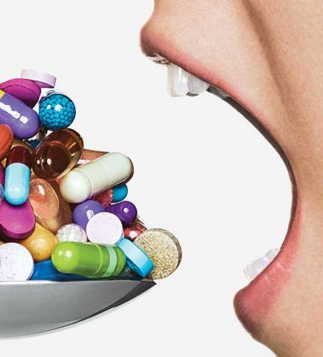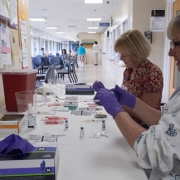So-Called ‘Gluten Enzymes’ a Bust for Celiacs
 For those with celiac disease, it is dangerous to rely on a pill to help digest gluten.
For those with celiac disease, it is dangerous to rely on a pill to help digest gluten.
- Sarah Garone, msn.com/en-us 1
We all know someone—or probably a lot of someones—who don’t eat gluten. In all likelihood, that someone may even be you. As of 2017, 3.1 million Americans reported actively avoiding this protein found in wheat, barley, and rye. (We’re willing to bet that by 2020, that number has likely risen even higher.)
Laying aside the usual snarky discussion about who does and does not actually need to go gluten-free, there are plenty of legit reasons why people steer clear of this common protein. Maybe you’ve got an ironclad diagnosis of celiac disease, the autoimmune condition that makes eating gluten impossible (and health-threatening). Or maybe you’ve eliminated gluten for relief from bloating, abdominal pain, and gas—a constellation of symptoms known as non-celiac gluten sensitivity (NCGS).
Turns out, a number of supplements now claim to offer this fix. So-called gluten digestion pills are being marketed as the ticket to smooth sailing—intestinally speaking. But can you really bring on the spaghetti and croissants with just a little pill? Here’s what you need to know.
How do gluten digestion pills and supplements work?
As of 2020, several brands have come out with their own versions of gluten-digesting supplements. Most of them come in pill form and contain a proprietary blend of enzymes intended to help the body break down gluten. CVS GlutenAid Fast-Acting Capsules, for example, say it’s “specially formulated for individuals who feel unwell after eating wheat or grain.” Meanwhile, other brands like MaryRuth’s Gluten-Relief Enzymes and Now Gluten Digest claim to “support optimal digestion of gluten” and “promote the complete digestion of cereal grains.” Some pills even boast the combo of improving both gluten and dairy digestion.
While each product is a little different, most boil down to the same handful of digestive enzymes, such as amylase, protease, and something called dipeptidyl peptidase IV, or DPP IV, for short. Theoretically, giving your body more of these enzymes is could help your digestive tract better dismantle gluten, leading to fewer adverse symptoms. It’s theoretically like a gluten version of Lactaid, the OTC pills that contain lactase enzymes to help people who are lactose-intolerant better digest dairy products.
What the experts think about gluten digestion supplements
While talk of enzymes and digestive breakdown all sounds highly scientific, some experts are skeptical that gluten-digesting pills really get to the source of the problem.
“The descriptions of some of the gluten-digesting products state that the ingredients act upon the carbohydrate component of gluten-containing grains,” says Julie Stefanski, RDN, a spokesperson for the Academy of Nutrition and Dietetics. “But gluten is a protein, not a carbohydrate—so the ingredients in a supplement may not target the actual source of discomfort.”
Research on the pills’ effectiveness is also mixed. A 2015 study looked at digestive supplements containing protease and found they didn’t break down the part of gluten that creates an immune response. On the other hand, a 2018 study on a supplement with peptidase—another common ingredient in these pills—showed it actually did improve symptoms in people with NCGS. Because so few studies have been conducted on the subject, there’s no great medical consensus on what these enzyme blends can and can’t do.
We do know, though, that the right enzymes are important for digestive health in general. “Though their roles in breakdown of gluten in particular is not necessarily known, these enzymes are critical in digestion as a whole,” says gastroenterologist Peyton Berookim, MD, FACG. “Taking digestive enzymes should generally make people feel better because they are aiding in the breakdown process of proteins, fat, and carbohydrates, thus making it easier for one’s body to do its day-to-day job in digestion.” In short, if your digestion becomes healthier overall, you may find some relief from symptoms caused by eating gluten. But that’s not a guarantee.
Are these kinds of supplements safe?
Okay, so gluten-digesting pills may not be miracle medicine, but is it really so bad to give these products a whirl, just to see if they help? For those with NCGS, doctors say these supplements are likely fine—but far from a panacea. “Digestive enzymes and DPP-IV are typically safe when taken in moderate doses,” says Dr. Berookim. However, as with any new supplement, talk to your doctor first to make sure they’re okay with you trying them—and that they won’t interfere with any other meds you take.
However, for those with celiac disease, it is dangerous to try and rely on a pill to help digest gluten. “One of the main differences between NCGS and celiac disease is the fact that gluten is harmful to those with celiac disease,” says Stefanksi.
With celiac, repeatedly consuming gluten triggers a harmful immune response that over time can damage the small intestine and lead to malnutrition, bone loss, and increased likelihood of other autoimmune diseases. (To be fair, some brands explicitly state on their labels that their product is not recommended for people with celiac disease.)
Besides, with celiac disease, you can’t necessarily tell how your body is responding to gluten just by how your stomach feels. “It’s important for those with celiac disease not to judge gluten exposure by GI symptoms only,” advises Stefanski. “Just like when our bodies fight off a cold, individuals with celiac disease can’t [always] feel their bodies having an immune response to gluten.”
Despite the glowing product claims, there is really only minimal evidence that these types of supplements reduce NCGS symptoms like bloating and belly pain.
“Due to the lack of proper scientific research in this area, much of the feedback that’s out there is strictly anecdotal,” says Dr. Berookim. And again, they are not safe for people with celiac disease.
Like most things in life, the issue of gluten sensitivity probably can’t be fixed with a simple pill. (Darn.)
According to Stefanski, the best thing for those with problems eating gluten (or those with celiac disease) is to take a more comprehensive approach: “Individuals with GI reactions to certain foods should work with their healthcare provider to determine the cause, rather than using an over-the-counter product to just treat the symptoms.” Hear, hear.
Whatever your reason for joining the GF club, a little part of you probably sometimes wishes you could have back the pastas, breads, and cereals that used to comprise a major part of your diet. Wouldn’t it be nice if you could just take a pill and make your gluten-y dreams come true?













